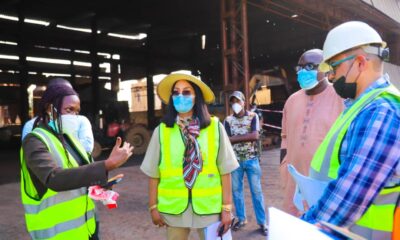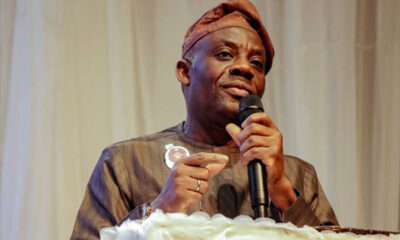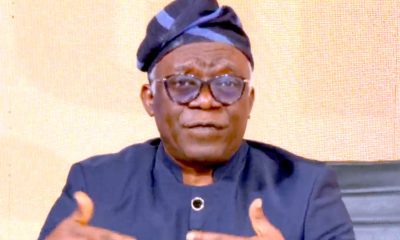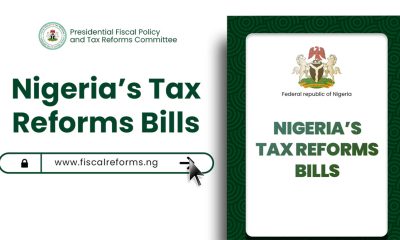Business
FG begs private sector operators to fund public infrastructure

The Federal government has solicited the full support of its private sectors partners, local and foreign partners, financial institutions and other important key stakeholders towards the successful implementation of the government’s new public private partnership policy.
Minister of Finance, Budget and National Planning, Zainab Ahmed, who stated this, stressed that the FG hoped to fund public infrastructure facilities through other viable options aside from budgetary allocations.
Ahmed noted that one of the options is the adoption of public-private partnership (PPP).
A PPP allows for a large-scale government projects, such as roads, bridges, or hospitals, to be completed with private funding.
Speaking during a webinar on financing PPP to boost infrastructural development, Zainab said a review of the federal budgets in the past few years shows that the resources are insufficient to bridge the country’s infrastructure deficit.
She noted that the country would need the sum of $3 trillion over the next 30 years to bridge the infrastructure deficit.
“Notwithstanding this, we have not been able to fully unlock the potentially huge benefits afforded by PPPs, due to the absence of a comprehensive PPP framework setting out institutional responsibilities,” she was quoted by Yunusa Abdullahi, her media aide.
“Which would provide investors with the necessary comfort to commit capital towards infrastructure development.
“As you may be aware, there are some other initiatives being taken by the government in the PPPs space such as the ongoing review of the guidelines on viability gap funding, and management of contingent liability that have both reached advanced stages.
“In addition, from 2021/2022 budget cycle, all infrastructure projects must be screened for PPP suitability and compliance with the national integrated infrastructure master plan by the federal ministry of finance budget and national planning and BPE before inclusion in the national budget and subsequent procurement.
“Are to ensure that PPP takes a center stage in the procurement of infrastructure in Nigeria. The government is ready and willing to dialogue and incorporate valuable suggestions from stakeholders with a view to further strengthening Nigeria’s PPP framework.
“We are, therefore, counting on the support and cooperation of our public and private sectors partners, our local and foreign partners, financial institutions and other important key stakeholders towards the successful implementation of the government’s new PPP policy directive.”
Business
Imo Economic Summit: Aliko Dangote Vows to Become State’s Largest Investor

Imo Economic Summit: Aliko Dangote Vows to Become State’s Largest Investor
OWERRI — Africa’s richest man, Aliko Dangote, has assured Imo State Governor Hope Uzodimma that the Dangote Group is prepared to become one of the biggest investors in Imo State, reaffirming the conglomerate’s commitment to expanding its footprint in Nigeria.
Speaking on Thursday during the opening session of the Imo Economic Summit 2025, Dangote called on the state government to specify key sectors requiring investment, promising immediate action once directives are given.
Dangote, who described Governor Uzodimma as a long-time friend, commended him for fostering an enabling environment for business and economic growth in the state.
READ ALSO:
- NSCDC rejects VIP protection requests from senators as demand surges after police withdrawal
- Edo Assembly Moves to Arrest Obaseki, Others Over MOWAA, Radisson Hotel Probe
- Three Top Contenders to Replace William Troost-Ekong as Super Eagles Captain
“We will be one of your biggest investors in Imo. So please tell me the area to invest and we will invest,” he said.
The African industrialist also encouraged Nigerian entrepreneurs to focus on developing their home regions, stressing that sustainable economic growth cannot depend on foreign capital alone.
“What attracts foreign investors is a domestic investor. Africa has about 30 percent of the world’s minerals. We are blessed,” he noted.
Dangote further highlighted progress at the Dangote Refinery, announcing that the facility is on track to achieve a 1.4 million barrels-per-day production capacity, making it the largest single-train refinery in the world.
The assurance marks a significant boost for Imo State’s investment outlook as the government continues efforts to strengthen its economy and attract large-scale private sector participation.
Imo Economic Summit: Aliko Dangote Vows to Become State’s Largest Investor
Auto
Court of Appeal Affirms Ruling Barring VIO from Seizing Vehicles or Fining Motorists

Court of Appeal Affirms Ruling Barring VIO from Seizing Vehicles or Fining Motorists
The Court of Appeal, Abuja, on Thursday, upheld a previous Federal High Court judgment prohibiting the Vehicle Inspection Officers (VIO) and the Directorate of Road Traffic Services (DRTS) from confiscating vehicles or imposing fines on motorists without lawful authority.
A three-member panel of appellate justices, led by Justice Oyejoju Oyewumi, dismissed the appeal filed by the VIO, describing it as lacking merit and affirming the October 16, 2024 ruling of the high court.
The original suit, marked FHC/ABJ/CS/1695/2023, was filed by public interest lawyer Abubakar Marshal, who alleged that he was unlawfully stopped and had his vehicle confiscated by VIO officials at Jabi District, Abuja, on December 12, 2023. He contended that the action was a violation of his fundamental rights.
READ ALSO:
- FG secures release of three Nigerians detained in Saudi Arabia
- Groups Reject Senator’s Call for Removal of NSA Nuhu Ribadu
- US authorities arrest Nigerian CEO Cashmir Chinedu Luke for alleged $7m VA fraud
Justice Nkeonye Maha of the Federal High Court had declared that no law empowers the VIO to stop, seize, impound, or fine motorists, and granted a perpetual injunction restraining the agency and its agents from further violating citizens’ freedom of movement, presumption of innocence, and right to own property.
The court held that only a court of competent jurisdiction can impose fines or sanctions on motorists. It further ruled that the actions of the Respondents violated Section 42 of the 1999 Constitution and relevant articles of the African Charter on Human and Peoples’ Rights.
Although the applicant had sought N500 million in damages and a public apology, the court awarded him N2.5 million. Respondents included the Director of the Directorate of Road Traffic Services, the Abuja Area Commander, the team leader, and the Minister of the Federal Capital Territory.
The appellate court’s decision confirms that the VIO and DRTS cannot legally harass motorists, reinforcing citizens’ constitutional rights on the road.
Court of Appeal Affirms Ruling Barring VIO from Seizing Vehicles or Fining Motorists
Business
BREAKING: CBN Removes Cash Deposit Limits, Raises Weekly Withdrawal

BREAKING: CBN Removes Cash Deposit Limits, Raises Weekly Withdrawal
The Central Bank of Nigeria (CBN) has announced sweeping changes to its cash-handling regulations, removing all limits on cash deposits and increasing the weekly cash withdrawal limit across all channels to N500,000, up from N100,000.
The changes were detailed in a circular titled “Revised Cash-Related Policies,” issued to all banks and signed by Dr. Rita Sike, Director of the Financial Policy & Regulation Department.
According to the apex bank, the revised framework is part of ongoing efforts to reduce the rising cost of cash management, strengthen security, and address money laundering concerns linked to Nigeria’s heavy dependence on cash transactions. The CBN noted that previous cash-related policies were introduced to discourage excessive cash usage and promote electronic payment systems, but evolving realities necessitated an update.
Effective January 1, 2026, several major adjustments will take effect. The cash deposit limit has been completely removed, and charges on excess deposits have been scrapped. Weekly withdrawal limits have also been increased to N500,000 for individuals and N5 million for corporate entities, with withdrawals beyond these levels attracting prescribed excess charges.
READ ALSO:
- U.S imposes visa restrictions on Nigerians over mass killings, alleged violence against Christians
- NDIC Warns Nigerians Against Ponzi Schemes, Urges Savings Only in CBN-Licensed Banks
- Nigeria Urged to Prioritize Citizenship, Social Harmony Amid Rising Conflict, Insecurity
The special monthly authorisation, which previously allowed individuals to withdraw N5 million and corporates N10 million once a month, has been discontinued.
For ATM withdrawals, the daily limit remains N100,000 per customer, with a maximum of N500,000 weekly, forming part of the overall withdrawal limit applicable to all channels, including POS transactions.
Excess withdrawals above approved thresholds will attract fees of 3% for individuals and 5% for corporate customers, shared between the CBN and the operating bank in a 40:60 ratio.
Banks have also been instructed to load all currency denominations in ATMs. The cap on over-the-counter encashment of third-party cheques remains fixed at N100,000, and such payments will count toward the cumulative weekly withdrawal limit.
Furthermore, financial institutions are required to submit monthly compliance reports to supervisory departments, including the Banking Supervision Department, Other Financial Institutions Supervision Department, and Payments System Supervision Department.
The circular clarified that revenue-generating accounts of federal, state, and local governments, as well as accounts held by microfinance and primary mortgage banks, are exempt from the new rules. However, long-standing exemptions previously granted to embassies, diplomatic missions, and aid-donor agencies have now been removed.
BREAKING; CBN Removes Cash Deposit Limits, Raises Weekly Withdrawal
-

 News3 days ago
News3 days agoDefence Minister Unveils New Security Strategy, Orders Troops to Shoot Armed Bandits on Sight
-

 metro3 days ago
metro3 days agoTeam Justice accuses authorities of attempting to exclude Mohbad’s father from DNA test process
-

 metro3 days ago
metro3 days agoSenate Launches Emergency Probe into Widespread Lead Poisoning in Ogijo, Lagos/Ogun
-

 International3 days ago
International3 days agoMeta to Block Under-16s from Instagram, Facebook, Threads ahead of Australia’s World-First Youth Social Media Ban
-

 metro3 days ago
metro3 days agoShocking confession: Boyfriend admits luring FRSC officer, child to death in Osun ritual murder
-

 Sports3 days ago
Sports3 days agoLeeds United Stun Chelsea 3-1 at Elland Road to Climb Out of Relegation Zone
-

 News3 days ago
News3 days agoBREAKING: Tinubu Sends Fresh Ambassadorial Nominations to Senate, Names Ibas, Ita Enang, Dambazau
-

 News3 days ago
News3 days agoEmber-months safety: Carloha, FRSC intensify campaign against distracted driving













